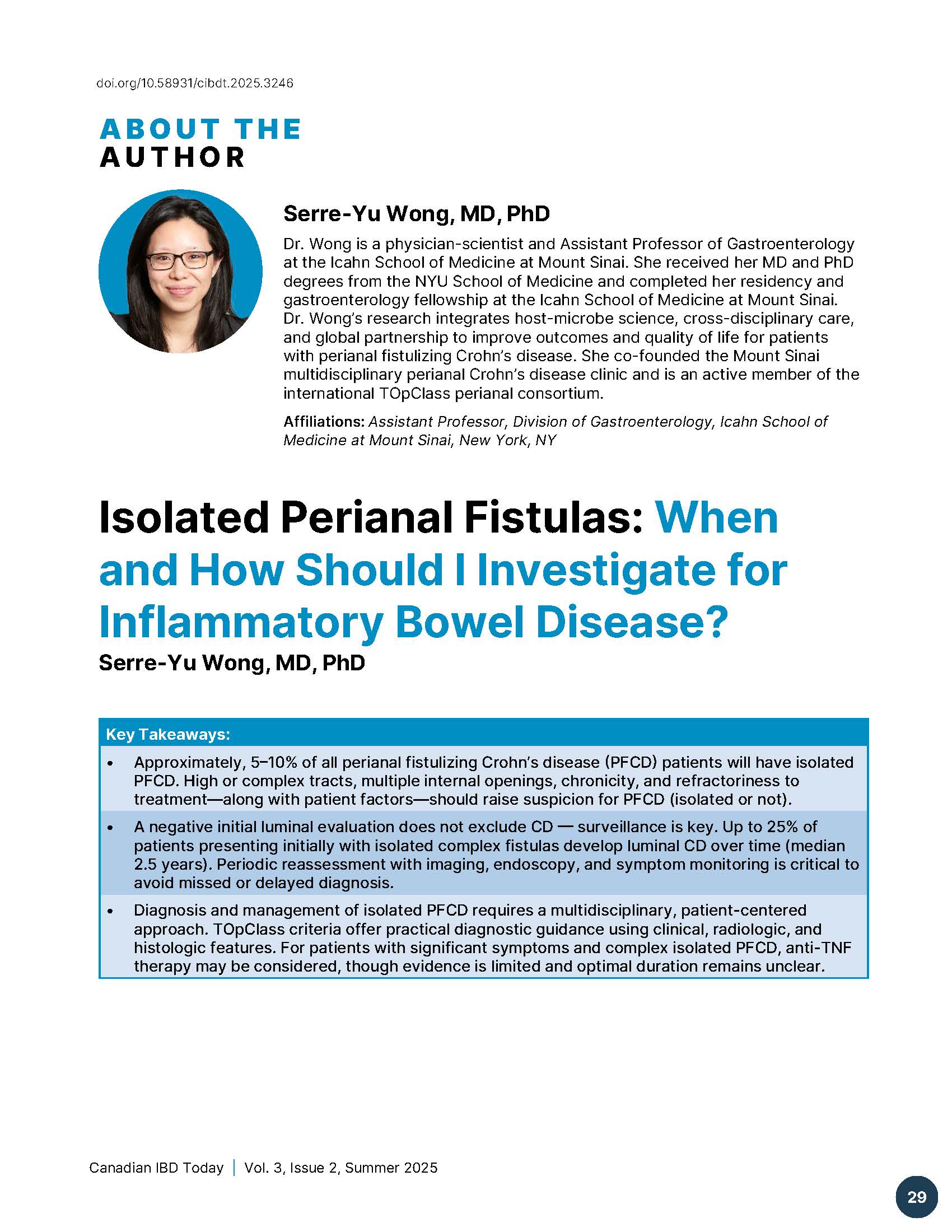Isolated Perianal Fistulas: When and How Should I Investigate for Inflammatory Bowel Disease?
DOI:
https://doi.org/10.58931/cibdt.2025.3246Abstract
Key Takeaways:
• Approximately, 5–10% of all perianal fistulizing Crohn’s disease (PFCD) patients will have isolated PFCD. High or complex tracts, multiple internal openings, chronicity, and refractoriness to treatment—along with patient factors—should raise suspicion for PFCD (isolated or not).
• A negative initial luminal evaluation does not exclude CD — surveillance is key. Up to 25% of patients presenting initially with isolated complex fistulas develop luminal CD over time (median 2.5 years). Periodic reassessment with imaging, endoscopy, and symptom monitoring is critical to avoid missed or delayed diagnosis.
• Diagnosis and management of isolated PFCD requires a multidisciplinary, patient‑centered approach. TOpClass criteria offer practical diagnostic guidance using clinical, radiologic, and histologic features. For patients with significant symptoms and complex isolated PFCD, anti-TNF therapy may be considered, though evidence is limited and optimal duration remains unclear.
References
Tsai L, McCurdy JD, Ma C, Jairath V, Singh S. Epidemiology and natural history of perianal Crohn’s disease: a systematic review and meta-analysis of population-based cohorts. Inflamm Bowel Dis. 2022;28(10):1477–1484. doi:10.1093/ibd/izab287 DOI: https://doi.org/10.1093/ibd/izab287
Zhou Z, Ouboter LF, Peeters K, Hawinkels L, Holman F, Pascutti MF, et al. Crohn’s disease-associated and cryptoglandular fistulas: differences and similarities. J Clin Med. 2023;12(2):466. doi:10.3390/jcm12020466 DOI: https://doi.org/10.3390/jcm12020466
Adegbola SO, Dibley L, Sahnan K, Wade T, Verjee A, Sawyer R, et al. Burden of disease and adaptation to life in patients with Crohn’s perianal fistula: a qualitative exploration. Health Qual Life Outcomes. 2020;18(1):370. doi:10.1186/s12955-020-01622-7 DOI: https://doi.org/10.1186/s12955-020-01622-7
Panes J, Reinisch W, Rupniewska E, Khan S, Forns J, Khalid JM, et al. Burden and outcomes for complex perianal fistulas in Crohn’s disease: systematic review. World J Gastroenterol. 2018;24(42):4821–4834. doi:10.3748/wjg.v24.i42.4821 DOI: https://doi.org/10.3748/wjg.v24.i42.4821
Chen G, Pedarla V, Null KD, Cazzetta SE, Khan QR, Schwartz DA. Health care costs and resource utilization among patients with Crohn’s disease with and without perianal fistula. Inflamm Bowel Dis. 2022;28(6):870-877. doi:10.1093/ibd/izab198 DOI: https://doi.org/10.1093/ibd/izab198
Adler J, Gadepalli S, Rahman M, Kim S. Early tumour necrosis factor antagonist treatment prevents perianal fistula development in children with Crohn’s disease: post hoc analysis of the RISK study. Gut. 2025;74(4):539–546. doi:10.1136/gutjnl-2024-333280 DOI: https://doi.org/10.1136/gutjnl-2024-333280
Cho WJ, Wong SY. A guide through the tunnel: updates in the approach to classification and management of perianal fistulizing Crohn’s disease. Curr Gastroenterol Rep. 2025;27(1):46. doi:10.1007/s11894-025-00998-0 DOI: https://doi.org/10.1007/s11894-025-00998-0
Hanna LN, Anandabaskaran S, Iqbal N, Geldof J, LeBlanc JF, Dige A, et al. Perianal fistulizing Crohn’s disease: utilizing the topclass classification in clinical practice to provide targeted individualized care. Clin Gastroenterol Hepatol. 2025;23(6):914–926. doi:10.1016/j.cgh.2024.06.047 DOI: https://doi.org/10.1016/j.cgh.2024.06.047
Molendijk I, Nuij VJ, van der Meulen-de Jong AE, van der Woude CJ. Disappointing durable remission rates in complex Crohn’s disease fistula. Inflamm Bowel Dis. 2014;20(11):2022–2028. doi:10.1097/mib.0000000000000148 DOI: https://doi.org/10.1097/MIB.0000000000000148
Schwartz DA, Loftus EV, Jr., Tremaine WJ, Panaccione R, Harmsen WS, Zinsmeister AR, et al. The natural history of fistulizing Crohn’s disease in Olmsted County, Minnesota. Gastroenterology. 2002;122(4):875–880. doi:10.1053/gast.2002.32362 DOI: https://doi.org/10.1053/gast.2002.32362
Sangmo L, Quraishi B, Rajauria P, Giselbrecht E, Colombel JF, Ungaro R, et al. Natural history of clinically suspected isolated perianal fistulizing Crohn’s disease. Clin Gastroenterol Hepatol. 2025;23(4):671–673.e672. doi:10.1016/j.cgh.2024.09.016 DOI: https://doi.org/10.1016/j.cgh.2024.09.016
Chin Koon Siw K, Engel J, Visva S, Mallick R, Hart A, de Buck van Overstraeten A, et al. Strategies to distinguish perianal fistulas related to Crohn’s disease from cryptoglandular disease: systematic review with meta-analysis. Inflamm Bowel Dis. 2022;28(9):1363–1374. doi:10.1093/ibd/izab286 DOI: https://doi.org/10.1093/ibd/izab286
Munster LJ, Hanna LN, Hart AL, Tozer PJ, Buskens CJ, van der Bilt JDW. Diagnosing Crohn’s disease in presumed cryptoglandular perianal fistulas: an expert Delphi consensus on early identification of patients at risk of Crohn’s disease in perianal fistulas (PREFAB). J Crohns Colitis. 2025;19(1):jjaf002. doi:10.1093/ecco-jcc/jjaf002 DOI: https://doi.org/10.1093/ecco-jcc/jjaf002
Hanna LN, Munster LJ, Joshi S, Wendelien van der Bilt JD, Buskens CJ, Hart A, et al. Isolated perianal Crohn’s disease: a systematic review and expert consensus proposing novel diagnostic criteria and management advice. Lancet Gastroenterol Hepatol. 2025. doi:10.1016/s2468-1253(25)00007-x DOI: https://doi.org/10.1016/S2468-1253(25)00007-X
McCurdy JD, Weng R, Parlow S, Dawkins YM, Brar G, Oliveira L, et al. Video capsule endoscopy can identify occult luminal Crohn’s disease in patients with isolated perianal fistulas. J Crohns Colitis. 2023;17(10):1624–1630. doi:10.1093/ecco-jcc/jjad078 DOI: https://doi.org/10.1093/ecco-jcc/jjad078
Dige A, Nordholm-Carstensen A, Hagen K, Hougaard HT, Krogh K, Agnholt J, et al. Effectiveness of infliximab treatment of complex idiopathic anal fistulas. Scand J Gastroenterol. 2021;56(4):391–396. doi:10.1080/00365521.2021.1879246 DOI: https://doi.org/10.1080/00365521.2021.1879246
Fiske HW, Tse CS, Al-Bawardy B, Magavi P, Konijeti GG, Mao E, et al. Clinical course of isolated recurrent, persistent complex perianal fistulas without luminal Crohn’s disease: a multicenter case series of 24 patients. Crohns Colitis 360. 2024;6(4):otae065. doi:10.1093/crocol/otae065 DOI: https://doi.org/10.1093/crocol/otae065
Rinawi F, Greer MC, Walters T, Church PC, Ricciuto A, Langer JC, et al. Anti TNF treatment of complex perianal fistulas in children without luminal Crohn’s disease: Is it an option? J Pediatr Surg. 2022;57(11):569–574. doi:10.1016/j.jpedsurg.2022.03.031 DOI: https://doi.org/10.1016/j.jpedsurg.2022.03.031
McCurdy JD, Parlow S, Dawkins Y, Samji K, Rhee GG, Oliveira L, et al. Tumor necrosis factor inhibitors may have limited efficacy for complex perianal fistulas without luminal Crohn’s disease. Dig Dis Sci. 2020;65(6):1784–1789. doi:10.1007/s10620-019-05905-y DOI: https://doi.org/10.1007/s10620-019-05905-y

Published
How to Cite
Issue
Section
License
Copyright (c) 2025 Canadian IBD Today

This work is licensed under a Creative Commons Attribution-NonCommercial-NoDerivatives 4.0 International License.
